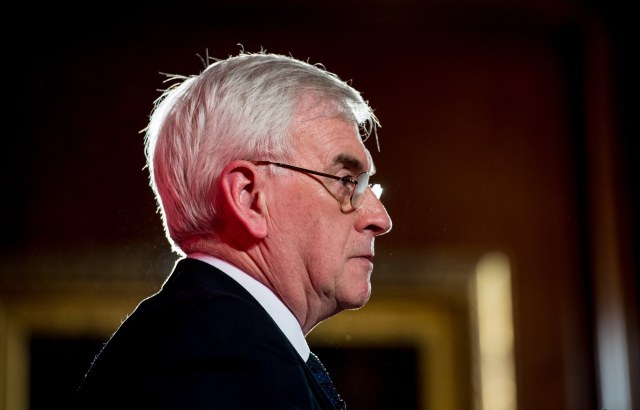Labour Party Shadow Chancellor John McDonnell. Credit: Chris J Ratcliffe / Getty

Is it possible to detoxify the political debate in Britain, as I discussed in my last column for UnHerd? Certainly it isn’t enough to moan about it. We need to determine a practical response, create some rules.
A way to do this would be to identify, isolate and attempt to avoid the tactics which have so demeaned our political conversation. There are enough of these for a long-running series. But the one I’d like to single out here is the increasingly prevalent and flagrant insincere offence-claiming. This has run rampant in the age of social media and often rides pillion with its cousin: the wilful misinterpretation of words. Together they form a potent – and quite evidently attractive – combination.
Two textbooks examples of this have recently been provided, from both Right and Left.
At the weekend, the centre-left Labour MP Chuka Umunna gave a speech in which he warned his own party about its decline into incivility. Specifically, Umunna warned that Labour’s leader, Jeremy Corbyn, was driving moderate Labour MPs like him out of the party. In the course of the speech, Umunna asked Corbyn to “call off the dogs”. It’s a commonly enough heard phrase, and one which might be said to be apt in the age of the grass-roots ‘Momentum’ movement.
You would expect the Labour party leadership to treat such a call from one of its own MPs with some degree of seriousness. At the very least, it might have attempted to make some fact-based excuses for Momentum and the behaviour of its members. But it chose not to. Instead, it chose to misinterpret Umunna’s remarks and then claim offence.
The Shadow Chancellor, John McDonnell, was the one put forward to counter Umunna’s claims. How did he choose to reply? He condemned the comments as “grossly offensive”. And he went on to make the important point: “Our party members are not dogs.”
This is a beautiful example of the genre. Nobody ever claimed that the Labour party’s membership consisted in small or large part of dogs. But McDonnell’s deliberate misinterpretation meant he could claim that Umunna had – for shame – insulted the grassroots members of his own party. As a result, McDonnell successfully avoided answering any serious questions around why his party is carrying out a purge of moderate MPs.
This is not an approach only favoured by the political Left. The Right wants a piece of this cynical tactic as well.
Over the same weekend, the former Foreign Minister and perennial leader-in-waiting Boris Johnson fired another salvo at the Prime Minister and her handling of the Brexit negotiations. In a piece for the Mail on Sunday, Johnson wrote that Theresa May’s current plan for Brexit approximates her having “wrapped a suicide vest” around the British constitution and then “handed the detonator” to Brussels. Whether one agrees with it or not, it is certainly a vivid and memorable image.
Of course there are some people – even in his own party – who do not like Boris Johnson, do not want him to become leader of the Conservative party, and who will do everything they can to prevent him getting the top job. There are well-founded criticisms that can be made of him. But how unsurprising that his opponents decided to go down the the fake criticism route (the mishearing and offence claiming approach).
The normally sensible and sane Conservative MP Tom Tugendhat, chair of the Foreign Affairs Committee has long been anti-Boris. Just as McDonnell has long been anti-Chuka. And so the “suicide vest” comment came as manna for him. His response:
https://twitter.com/TomTugendhat/status/1038535110482698240
It is quite possible that Tugendhat genuinely finds Johnson’s choice of metaphor utterly unforgivable. It is possible that he, and anyone else who has ever experienced a suicide bombing, should be the guardians of that metaphor – choosing when it may be tactfully employed and by whom.
But it is more likely that Tugendhat – as someone who has been anti-Brexit and anti-Boris for a long time – simply saw his opportunity and took it: claiming that Boris had used suicide bomber in the same literal sense that Umunna had used “dogs”. He decided to take offence on behalf of all victims of suicide bombings, just as McDonnell claimed to be offended on behalf of non-canine members of the Labour party.
But this utterly transparent technique isn’t nearly as smart as the politicians like to think it is. And every time it is used, it increases ever so slightly, yet again, that feeling of generalised contempt that much of the public feels for the political class as a whole.
There’s an easy way to halt this unhappy trend. The fastest way to stop this rash of insincerity and cry-bullyness is simply be to call it out. For members of the public to say, we don’t believe you misunderstood the phrase; we don’t believe you’re genuinely offended; now behave like adults. And please, for a change, treat the electorate like adults too.










Join the discussion
Join like minded readers that support our journalism by becoming a paid subscriber
To join the discussion in the comments, become a paid subscriber.
Join like minded readers that support our journalism, read unlimited articles and enjoy other subscriber-only benefits.
Subscribe